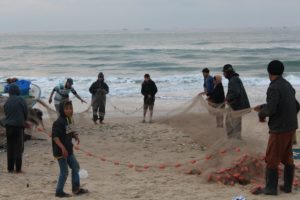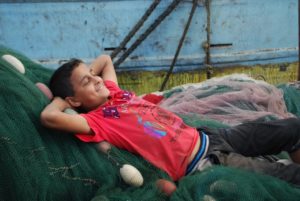This article by Gerd von der Lippe, board member of Ship to Gaza Norway, was published as a main debate article in the national, liberal newspaper, Dagbladet, in Norway, On 22 Nov, 2017
Is there any hope for the kids in Gaza? The answer is “no”, according to an Israeli, Arab psychologist, who regularly and voluntarily travels to Gaza to provide trauma therapy. The last 10 years have been dominated by blockade, occupation, drones being continually flown overhead, along with very little rebuilding of residences and infrastructure that has been destroyed. Most people in Gaza live in refugee camps – especially in Jabalya – and are most are traumatised, with children the ones who are suffering most. They are often extremely lean, maybe eating only once a day.
According to a doctor I have recently heard from, most of the children are only eating meat approximately once a month, chicken once a week and rarely fish.

When I visited Gaza a few years ago, we were able to stroll along the seashore and enjoy the sight of the Mediterranean. Now, rubbish is strewn everywhere and there is a pervasive stench. Seldom is an adult home when kids return to the refugee camps after their school day. Families are extremely poor with lots of children. Physically weak boys are continually beaten by aggressive friends, if they are not able to defend themselves. What is happening to girls, we can only imagine. As social conventions break down and despair permeates. Anything is likely to happen, because everything is permitted and everything is forbidden, according to the psychologist, Mohammed Mansour, in the interview he gave Ayelett Shani from Haaretz (see link above). There used to be solidarity in Gaza, with good, strong interpersonal ties, like exists in the Syrian refugee camps in Greece. Now, it is everyone for him/herself as community breakdowns accelerate. In the wake of the Israeli bombardment of 2014, the hope of a better life became for many out of reach. If improvement does not happen quickly, the next stage is perhaps civil war, which the aggressive Israeli neighbour could just watch calmly at a short distance, thinking that it is ‘not our problem… they only have themselves to blame, if they are fighting each other’.
Taxi drivers are so afraid that they often tell their passengers of their feelings of desparation. In restaurants, the waiters and in hospitals, the psychiatrists and psychologists are talking similarly. People are self-prescribing and taking large quantities of any drugs they can obtain in order to forget the bodily pain for a moment, without thinking about the negative side effects.

On one of my trips to Gaza in 2011, I did not meet any person older than 50 who did not use any sort of medicine. That was before 2014 and its aftermath. Now, young and old are using dangerous drugs, if they are able to get hold of them. The well-known Israeli author, journalist and critic of the blockade of Gaza, Gideon Levy, has written that Israel has not allowed any Israeli journalist into Gaza for over a decade in order “to spare Israelis the slight discomfort that the sights there might cause them”.
A female friend of mine in Gaza is one of the lucky ones. The two young kids in her family have both a mother and a father and a rented flat to live in. They have food to eat and a bed to sleep in. She is praying and hoping that the relationship between Fatah and Hamas can change from conflict to cooperation, after Hamas gave the Palestinian Authority (PA) control over the Rafah border crossing. If PA President Abbas arrives in Gaza later in November, she believes that she will then be able to cook a hot meal for her kids and that the water in the flat will cease to smell bad and be yellow-brown. Most of all, she is looking forward to visiting her relatives in the West Bank. She has just heard on the news that this transfer of the administrative control may not necessarily end with reconciliation and agreement. This is just a test, according to a report on Al Jazeera. When I asked her if this news has destroyed her hope, she answers after a while carefully: `I Can’t allow myself to lose the hope of a better future. That was why I married and got kids.”
Although Gaza according to Levy is being turned into a ghetto, we hope for an end of the blockade and that Gaza keeps on dreaming of freedom.


















